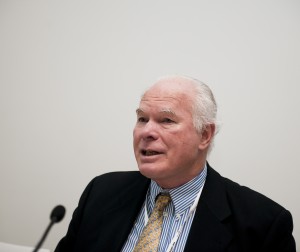January 1, 2011

Ross Mountain, during the launch of the Humanitarian Response Index 2010, European Development Days, December 2010.
Adopting a principled approach: The most effective way of having an efficient humanitarian response.
By Ross Mountain
In the course of this last year an estimated 350 million people were affected by major disasters, conflicts and crises. There are currently 10 million refugees, 27 million internally displaced and scores of millions more have their lives disrupted.
We have seen that climate change and rapid urbanisation are now combining to increase risks and vulnerabilities of affected populations. 2010 has seen two of the largest disasters in recent times: the earthquake in Haiti- now with the present cholera epidemic- and the unprecedented floods in Pakistan. With projections that over the next 20 years natural disasters may triple, we have a measure of the demands that will continue to be placed among those of us who seek to provide assistance to people in distress.
Demands are rising at a time of tight fiscal constraints. In 2009, 23 donor governments provided over US$11 billion of humanitarian assistance. This is a decrease of about 8% compared to humanitarian funding in 2008, with more cutbacks expected in 2011. The UN appeal for humanitarian operations in 2011 calls for $US 7.4 billion, one of the largest appeals ever, dramatically highlighting the need for increased efforts to support effective, impartial and independent humanitarian aid across the world.
Principles are more important than ever. Unfortunately, this year’s Humanitarian Response Index indicates that there has been quite a strain on these principles. The report highlights three aspects. The main one is the heightened politicisation and militarisation of humanitarian assistance. In ten of the 14 crises studied, such as Afghanistan and Somalia, this phenomena has been on the rise and has impeded the delivery of essential assistance to millions of people in need.
Secondly, increased restrictions on access have had negative consequences for vulnerable populations and aid workers. Donors need to advocate more for increased access to and protection of civilians. Finally, a recurring finding: there is still minimal investment in preparedness and local capacity development. If an ounce of prevention is worth a pound of cure, we should have 16 chances of getting this right and averting disasters for the same money.
Our field research indicates that people working in humanitarian agencies, including government officials working in humanitarian aid, are fully committed to preserving principled approaches to humanitarian assistance: the problem begins when other parts of governments seek to subordinate assistance to other aims.
We exhort donor governments to go back to basics, to the principles they agreed to in 2003. Adopting a principled approach is the most effective way of having an efficient humanitarian response. It is a way of delivering value for money in these austere times, increasing impact, alleviating suffering and ensuring protection.
Share this